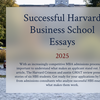Harvard has always been a popular target of the City Council, but some of this year's most vocal criticism has come from an unexpected source-Councillor William H. Walsh.
A two-term Council member, Walsh has won both his elections as a forceful critic of rent control. As a real estate lawyer, he has often been a natural ally for business and condominium developers.
"I don't think there's ever been a development project that Bill Walsh... didn't like, no matter how big, no matter how ugly," says Gladys P. Gifford, president of the Harvard Square Defense Fund.
But in the current Council session, Walsh has spent much of his time arguing that the city's largest developer-Harvard-is getting too much of a free ride.
Recent weeks have seen a rash of Walsh-sponsored proposals designed to make sure Harvard pays its fair share for city services.
Prominent among these efforts was an investigation of the payments Harvard makes in lieu of taxes on buildings used for affiliated housing, such as Peabody Terrace. At a Council hearing on the matter, Walsh described the alternative payments an example of "the Derek Bok philosophy" of avoiding responsibility to the city.
And at last week's meeting Walsh criticized a proposed restructuring of water payment rates as too kind to institutions, saying afterwards that the plan exemplified the city's "fear of the power of the universities."
Walsh says his current positions toward the University stem from a dinner for the Council that President Bok hosted last summer. At the meal, Walsh says he noticed a deterioriation in the state of relations between Harvard and the city.
He says he realized at the dinner that Harvard's support for city activities had fallen off. In particular, he says the University has reduced its help to the school system, such as assisting teachers and donating used equipment.
Harvard's Associate Vice President for State and Community Affairs Jacqueline O'Neill replies that the University recently gave a used bus to the North Cambridge Catholic High School, a private institution.
Now, Walsh says, the University receives benefits from the city without giving city institutions anything in return.
He adds that his recent proposals do not represent a change of heart.
"I've never had a pro-Harvard position," says Walsh. "Harvard is a neighbor, and you have to work with a neighbor."
The relationship between Harvard and the city is so complex, he says, that it took most of his first term for him to grasp it. Now, he says, he has the experience necessary to combat the University.
"You hear words like 'affiliated housing,'" he says. "But it took more than a year to get to the bottom of it."
Read more in News
Winter Returns With a Vengeance












